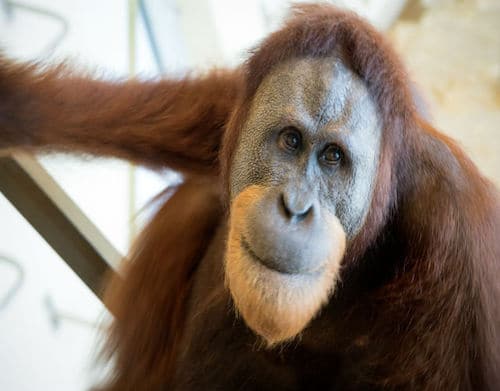 Evolution
Evolution
 Human Origins and Anthropology
Human Origins and Anthropology
An Orangutan “Speaks,” “Orates,” Engaging in “Conversation,” “Surprisingly Like Our Own”?

This has got to win some sort of a prize in the category of Underwhelming Scientific Findings Hailed as Evidence Against Human Exceptionalism. The first headline I saw was from the news site RT:
Orangutan wows scientists by aping human speech
An orangutan has begun to “speak” by reproducing some of the vowel sounds used by humans — a development scientists claim may bring us closer to understanding the evolution of human speech.
The findings, conducted by researchers at the University of Durham, suggest that Rocky, an 11-year-old orangutan, was able to learn new sounds and control his voice the way humans do in a conversation.
Sounds impressive — an ape that can almost “speak,” thus casting light on human evolution. But RT is the former Russia Today, so let the buyer beware. Except that more familiar and presumably reliable venues are also joining in. From the Christian Science Monitor:
Orangutans as orators? The ape’s speech is surprisingly like ours
While science continues to uncover the many interesting ways animals communicate with each other, we humans have long considered ourselves distinct from our most recent ancestors, thanks to our powers of elocution. Our range of vocal abilities is unique; it evolved after human lineage split off from our ape relatives.
Or so we thought.
The orangutan, named Rocky, a resident of the Indianapolis Zoo, is an “orator” with “speech” that’s “surprisingly like ours.” Wow. So this is the real thing? From the BBC News:
Orangutan ‘copies human speech’
An orangutan copying sounds made by researchers offers new clues to how human speech evolved, scientists say.
Rocky mimicked more than 500 vowel-like noises, suggesting an ability to control his voice and make new sounds.
It had been thought these great apes were unable to do this and, since human speech is a learned behaviour, it could not have originated from them.
Study lead Dr Adriano Lameira said this “notion” could now be thrown “into the trash can”.
The ape “copies human speech,” thus tossing “into the trash can” the “notion” that such voice control is unique to humans. From New Scientist:
Orangutan learns to mimic human conversation for the first time
An orangutan has shown an ability to emulate human speech for the first time — a feat that gets us closer to understanding how human speech first evolved from the communications of ancestral great apes.
‘Rocky’ the ginger ape has astonished experts by producing sounds similar to words in a “conversational context”.
Rocky “mimics” conversation, thus “astonish[ing] experts.” Alas, those experts are easily astonished. The Washington Post is a little more circumspect: “At first glance, this video of an orangutan imitating a trainer’s grunts may not seem incredibly significant.”
You can say that again. Now watch and listen to what was actually elicited from Rocky:
That’s it, the best they’ve got, presumably. If you weren’t prompted to think these noises are anything surprising, you would never take notice of them. When I was a kid, we had a poodle that my mother swore could, by barking, imitate and “sing” along with “I’m Forever Blowing Bubbles.” I’m not sure this is even on that level.
I don’t mean to put down the researchers’ work, which is reported in the journal Scientific Reports (“Vocal fold control beyond the species-specific repertoire in an orang-utan“), or to denigrate the efforts of Rocky. But these are not overwhelming results. This is not “speech.” And it’s certainly not language. See Dr. Michael Egnor’s post, “Do Animals Have Language?“
Compare Rocky’s imitative performance to that of Clover, the world’s “best talking parrot.”
To say there is no comparison between the “ape’s speech” and ours, never mind Clover, doesn’t do the situation justice. Even to call this a let down goes too far.
Our colleague Wesley Smith might point out the popular media’s agenda of axe-grinding against the exceptional status of human beings. And of course he would be right. Sensationalism born of a need to generate sexy headlines from meager material likely also plays a role.
Photo: Rocky, by Mark Kaser, via University of Durham.


